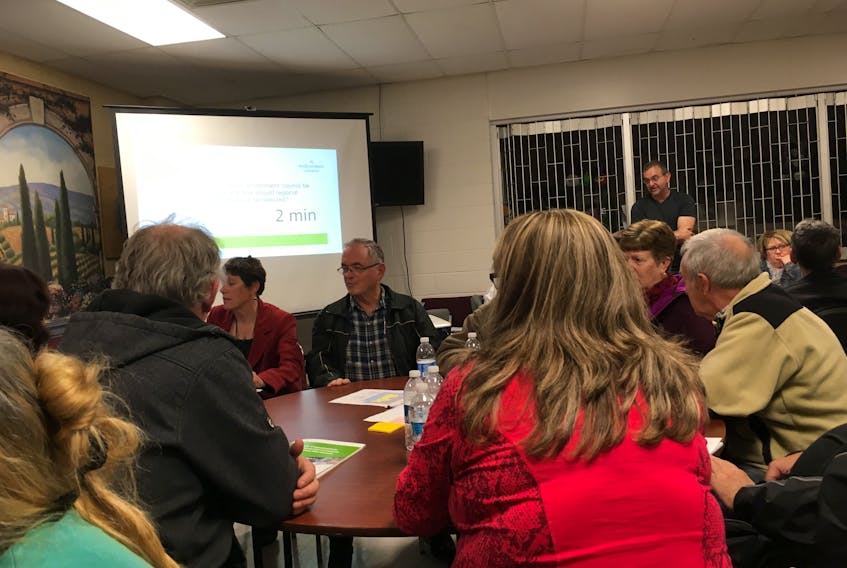PORT AUX BASQUES, NL – Public consultations on regional government got off to a rough start in Port aux Basques before people even got through the door.
The crowd was large enough that some were put on a waiting list to get in because of concerns about violating the building’s fire code.
When organizers pointed out that online registration had been open for weeks, some seniors rebutted that they don’t own computers, and without print advertisements they had only been made aware of the consultations a few hours previously from friends.
Inside, organizers claimed it was the largest consultation they had hosted by far, and the set up was far from ideal. Tables were too close together and crowded for participants to properly hear each other, or for the facilitator to record answers.
Almost immediately one gentleman, later identified as Harold Farrell, delayed the presentation when he rose to protest on several fronts, including why government was even thinking about regionalization.
“You’re more or less coming here telling us what you’re going to be doing,” he said.
Following the presentation, participants were invited to give feedback on nine specific questions posed under the consultations, but that didn’t sit well with some either.
“They’re asking the wrong questions,” said Bernadine Ryan, who worried the questions were skewed in such a way as to make a negative response seem somewhat favorable, “and the way those questions are worded you could completely screw up your answers.”
She also didn’t appreciate having to answer specific questions instead of giving her own feedback.
“There should have been an open discussion at the end of it but there wasn’t.”
Claudelle Devoe hails from the Codroy Valley and echoed a lot of Ryan’s sentiments.
“We were not given an opportunity to ask our own questions,” said Devoe, “only an explanation on the question before us.
“I am not sure what the advantages are of forming a regional government. We have all the services in place in our communities now and it seems to work fine for everyone.”
Many seem to think municipalities would be the primary beneficiaries of new tax revenues as local service districts (LSD) and unincorporated areas (UIC) are forced to pay more.
“We learned that in rural communities, we do not require the same services as town; therefore, a property tax would not warrant any extra services that we already have and pay for,” responds Devoe, who says she needs more specific details on how exactly things might work before she can ascertain any clear advantage to regionalization.
“The region is working together now with the towns and committees through various communities. Volunteers and people in the communities know what is needed in their own communities and have carried on in this capacity for many years and it’s quite effective.
John Spencer of Port aux Basques felt the general negativity towards government overrode the discussions.
“As an observer, and not representing council, I felt there was a lack of trust towards government on the part of many who were present. This resentment was both in relation to the process, and the overall objective of the public consultations,” Spencer wrote via email. “The final report needs to be cognizant of, and reflect, the underlying negative current towards regionalization that appeared among a cluster within the room.
‘For many, it was not a question of whether regional government would be good or bad for the area. It was about trust in government’s motives.”
Twitter: @tygerlylly









